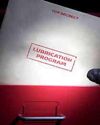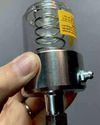
More about this ASCEND Factor
Factor: A4P - Sampling
Level: Platform (M)
Stage: Condition Monitoring, Lubricant Analysis and Troubleshooting
About: Accurate sampling is critical when developing a lubrication analysis program. Inaccurate samples can lead to incorrect decisions regarding machine performance.
Learn More: noria.com/ascend/
When we think about oil analysis, it really begins with the tools and modifications that are necessary to properly take an accurate oil sample. The key to accurate oil sampling is minimizing data disturbance by preventing contamination of the sampling equipment. When outside contaminants are introduced in any way, the analysis will come back with inconsistent reports. Oil analysis, at its core, tracks and predicts failure modes by trending data over time. Let's explore the equipment that needs to be installed to ensure contaminant-free sampling and the oil sampling methods that each of these tools requires.
Minimess Sampling Valves
Often called a sample probe, the minimess valve is one of the most common and consistently accurate modifications for oil sampling. These valves should be installed on an elbow for lines with a high viscosity. Minimess valves can also be used on low-pressure systems; however, low-pressure systems require a soft valve seat to avoid leakage.
Portable Minimess Sampling Valves
Diese Geschichte stammt aus der July - August 2022-Ausgabe von MACHINERY LUBRICATION INDIA.
Starten Sie Ihre 7-tägige kostenlose Testversion von Magzter GOLD, um auf Tausende kuratierte Premium-Storys sowie über 8.000 Zeitschriften und Zeitungen zuzugreifen.
Bereits Abonnent ? Anmelden
Diese Geschichte stammt aus der July - August 2022-Ausgabe von MACHINERY LUBRICATION INDIA.
Starten Sie Ihre 7-tägige kostenlose Testversion von Magzter GOLD, um auf Tausende kuratierte Premium-Storys sowie über 8.000 Zeitschriften und Zeitungen zuzugreifen.
Bereits Abonnent? Anmelden

The Secrets For Implementing A Clean lubricant Program
If you could find an investment that guaranteed a return 40 times greater than your initial investment, you probably wouldn't pass it up.

MAINTAIN? REPAIR? REPLACE?
When considering the life of any asset, the question arises: what types of interventions should be planned to keep it operating or to restore operation in the event of its failure?

Engineering Reports Should Be Like Bad Movies
I'm frequently asked to review engineering reports, and I'm continually baffled by how many engineers want to take their readers on a journey instead of getting to the point.

WHY SCHEDULED OIL CHANGES AREN'T ENOUGH TO MITIGATE LUBRICANT CONTAMINATION
There are few problems more insidious or damaging to large industrial machinery than contaminated lubricant.

LUBRICATION CONTAMINATION PREVENTION
How many articles have you read, or seminars listened to, that tout the value of contamination control? If you are like me, they number in the hundreds—if not thousands. One thing about these articles and seminars that bothers me is the word “control”.

LUBRICANT CONTAMINATION PREVENTION AND MITIGATION: A Guide For Maintenance Professionals
Lubricants are essential for the smooth and efficient operation of many types of machinery, from engines and turbines to gears and bearings.

TASK-BASED TRAINING | INSPECTING A SINGLE-POINT LUBRICATOR
A single-point lubricator is a device engineered to attach to a single unit to regularly and automatically deliver a small amount of clean grease or lubricating oil to a specific area.

TOP LEADERSHIP FOCUSES FOR IMPROVED RELIABILITY AND COST REDUCTION
Here’s a scenario that may sound eerily familiar – you have a new reliability initiative.

4 KEY ELEMENTS FOR INTERPRETING AN OIL ANALYSIS REPORT
Years ago, a customer came into my office, visibly upset. He had just received his second oil analysis report for one of his Caterpillar gas engines.

ASTM ENHANCEMENTS TO MICROSCOPIC PARTICLE IDENTIFICATION AND DOCUMENTATION
In 1982, Daniel Anderson published his influential book, \"Wear Particle Atlas\", which describes, sizes, and classifies particles found in oil.